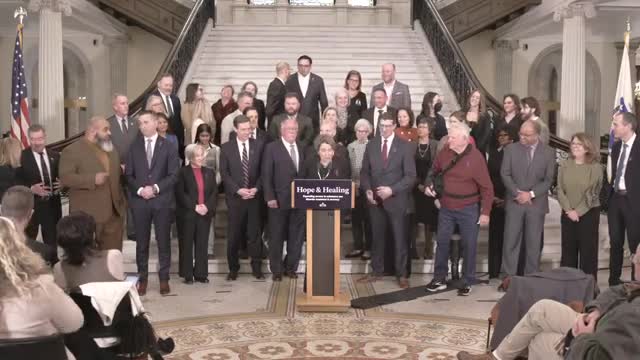Governor Maura Healey signs law expanding substance‑use treatment access and creating recovery coach licensure
Get AI-powered insights, summaries, and transcripts
Subscribe
Summary
Governor Maura Healey on Friday participated in a ceremonial signing of an act “relative to treatments and coverage for substance use disorder and recovery coach licensure,” a package of measures intended to broaden access to overdose reversal drugs, expand treatment options, and create licensure and insurance coverage for recovery coaches.
Governor Maura Healey on Friday participated in a ceremonial signing of an act “relative to treatments and coverage for substance use disorder and recovery coach licensure,” a package of measures intended to broaden access to overdose reversal drugs, expand treatment options, and create licensure and insurance coverage for recovery coaches.
The law requires insurers to cover opioid overdose reversal drugs without cost sharing or prior authorization and directs pharmacies to maintain adequate supplies, expands prescriber training and pharmacy education on nonopioid alternatives, and mandates insurance coverage for services provided by licensed recovery coaches. "This is a disease that knows no bounds," Governor Maura Healey said, calling the measure “another step” in efforts to treat substance use disorder as a health issue rather than a criminal one.
The bill also includes protections for harm‑reduction programs that offer drug‑checking services and shields workers who use drug testing equipment; modifies the state response to substance‑exposed newborns so that a parent following prescribed medication for addiction treatment will not automatically trigger a Department of Children and Families report; and strengthens anti‑discrimination protections for people taking medication for opioid use disorder and for some recipients of life and public health insurance who obtain overdose reversal drugs.
Representative Adrian Madero, chair of the House mental health, substance use and recovery committee, described the law as the product of extended negotiation with legislators, providers and people with lived experience and emphasized the law’s coverage and access provisions. "This act reaffirms Massachusetts' twofold commitment to prevent and reduce the fatality of overdoses and support and expand access to recovery and treatment," Madero said.
The legislation also directs Commonwealth executive agencies to develop, by 2027, a plan to ensure men receiving court‑ordered substance‑use treatment are placed in clinical settings rather than correctional facilities when appropriate, and it establishes recovery coach licensure and oversight within the Department of Public Health and a peer support program for recovery coaches and their employers.
Noelle Sierra, introduced as the new executive director of the Massachusetts Organization for Addiction Recovery, praised the measure’s provisions for recovery supports and licensure. "We're so grateful to be a part of a movement that has led to recovery support centers throughout the state," Sierra said, noting the law’s role in embedding recovery coaching within the continuum of care.
The signing was attended by legislative conferees, agency officials and advocates; speakers named Department of Public Health and behavioral health leaders and representatives from recovery and public health organizations who took part in drafting or supporting the legislation. The ceremony did not include a public reading of legislative vote tallies; the event focused on implementation and next steps.
Implementation will require the Department of Public Health, insurers, pharmacies and other agencies to issue implementing guidance and modify practices to meet the law’s coverage, licensing and planning requirements. Several speakers urged continued work to reduce stigma, expand harm‑reduction services and ensure the new licensing and coverage rules reach the people the law is intended to help.
Ceremonial signings do not themselves change administrative timelines; affected agencies and insurers will need to publish regulatory or operational details and, where noted in the act, meet the statutory planning deadline of 2027.
